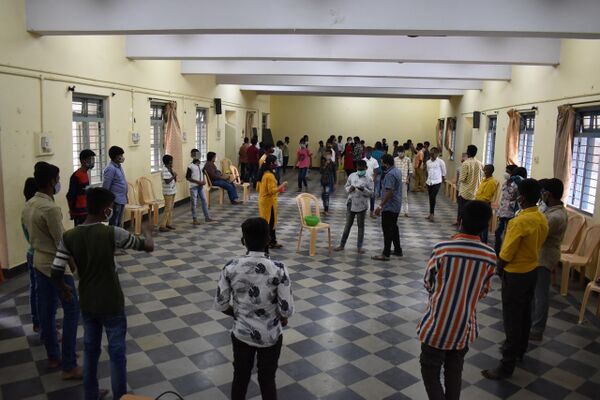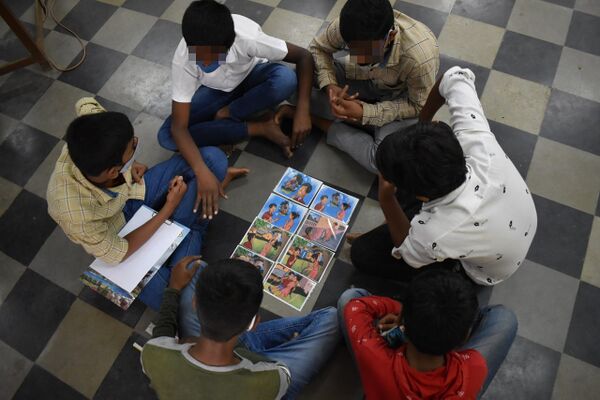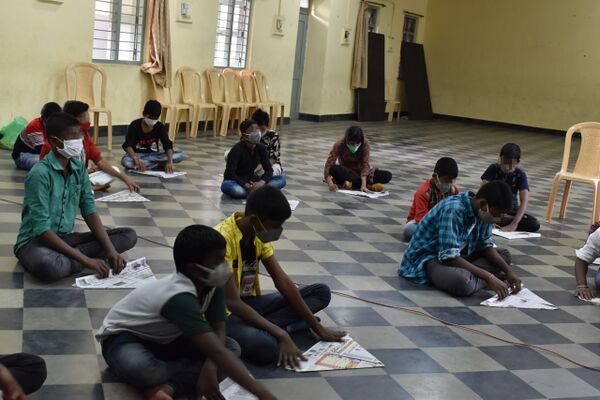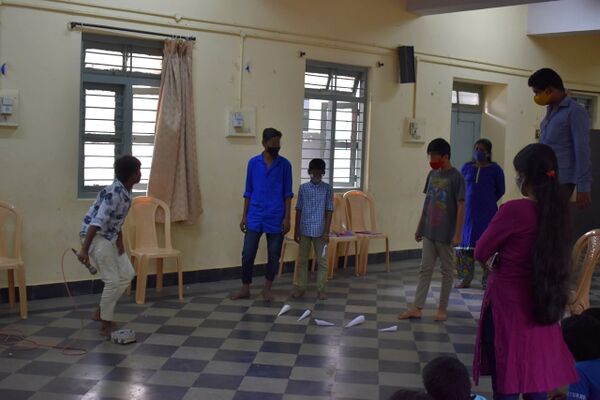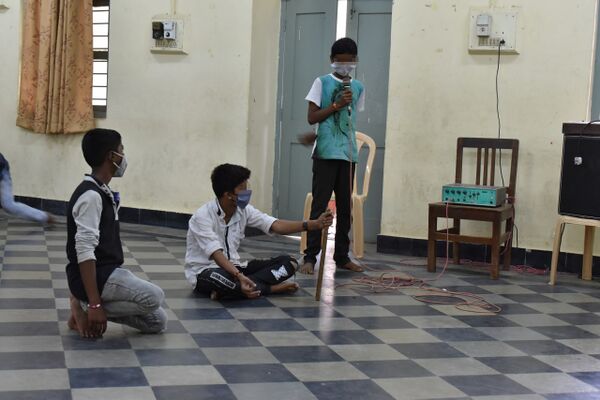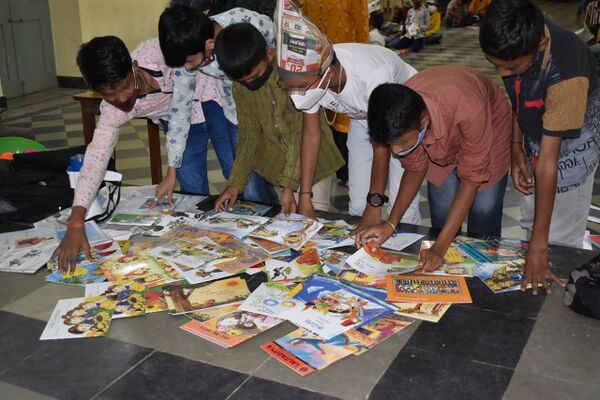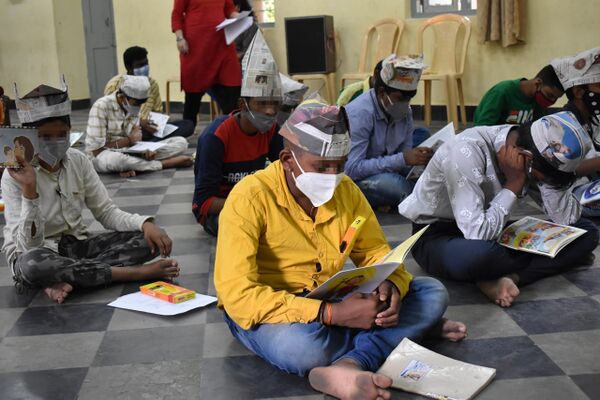Difference between revisions of "Back to School Camp 2021-22"
| Line 47: | Line 47: | ||
==== Ice-breaker activity ==== | ==== Ice-breaker activity ==== | ||
| + | [[File:Passing the ball.jpg|thumb|600x600px]] | ||
Most students were entering a new school with a new set of classmates and these activities were conducted to help students get familiar with one another and get to know about each other. | Most students were entering a new school with a new set of classmates and these activities were conducted to help students get familiar with one another and get to know about each other. | ||
| Line 56: | Line 57: | ||
* Tell us about the best gift you have ever got | * Tell us about the best gift you have ever got | ||
* Tell us the best and worst thing about your last week | * Tell us the best and worst thing about your last week | ||
| − | + | ||
'''Memory Game:''' Children are divided into groups and made to sit in circles. First person says out their name, the next person says out the first person's name and then their own name, the next person has to tell the first & second person's name and then their own name and the game continues with a new name getting added to the list with each turn. The game goes on till each person in the group has got a recite the entire list of the names in the group. With this activity, the children get a chance to learn the names of their new classmates and associate the names with their faces. The game can then be played again by choosing a theme - animals, sports, etc. and to make it slightly challenging, the children can be asked to recite the list by closing their eyes. | '''Memory Game:''' Children are divided into groups and made to sit in circles. First person says out their name, the next person says out the first person's name and then their own name, the next person has to tell the first & second person's name and then their own name and the game continues with a new name getting added to the list with each turn. The game goes on till each person in the group has got a recite the entire list of the names in the group. With this activity, the children get a chance to learn the names of their new classmates and associate the names with their faces. The game can then be played again by choosing a theme - animals, sports, etc. and to make it slightly challenging, the children can be asked to recite the list by closing their eyes. | ||
Revision as of 03:29, 22 September 2021
Returning to schools
After a disruption in learning caused by school closures for more than a year, schools are now being gradually opened and are exploring different approaches to bringing students back to classrooms. While parental consent is mandated for students to return to school, this begs the question of what meaningful choices parents may really have.
Lakhs of children who study in government and aided schools have been out of school and deprived of any structured learning experiences for over a year and a half. The issue is not only the learning loss - with reference to what they are supposed to have learnt in schools - as it is of the deprivation at multiple levels that these children have had to face - deficiency in nutrition, loss of a safe space and the loss of an opportunity to have some semblance of normalcy in their childhood.
Multiple studies both in India and globally emphasize the need for teaching, when schools reopen, to be informed by the learning level of each child in class and not the regular "syllabus" and the curriculum to undergo changes to focus on developing children's foundational abilities, literacy and numeracy. The approach to teaching and learning will need to respond not just to the curriculum change but also to the socio-emotional issues of students. This is essential to ensure that students don't feel alienated from the learning process and aren't forced to dropout.
Program at Govt. and Aided Schools in South 3 Block
With the Karnataka government's order allowing schools to reopen from 6th September for classes 6 to 8, in addition to classes 9 and 10 that have been running since the last week of August, schools are gearing up to bring children back in classrooms and into the learning process. ITfC has been conducting 2-day Back To School camps in government and aided schools in Bengaluru South 3 block with an aim to help children get comfortable with the school environment and with each other while they engage in fun educational activities.
Objectives of the Camp:
- To help students get reoriented to a structured learning environment
- To create a safe space for students to explore and learn
- To boost confidence among students in communicating with their peers
- To provide positive experiences of language interactions and thereby developing communication skills
An outline of the camp curriculum
The camp will combine elements of numeracy, literacy and basic life skills, with the overarching goal of getting students to become comfortable in the context of being in the school, with the various associated new routines, in terms of COVID preparedness. Addressing the questions and even anxieties children may have, especially in view of disruptions in their life out of school, will be an integral part of this camp. The theme stringing together all the activities will be one of enjoyable, relevant and meaningful learning, with activities designed for building successful learning experiences.
A tentative, day-wise agenda for the camp is described below:
| Day | Sessions |
|---|---|
| Day1 | Introduction to camp
Ice breaker activity Communicative competencies and Creativity - Story building and narration Playing with numbers and shapes Art and Craft |
| Day 2 | Indoor Games
Math and Language Puzzles Reading corner Communicative competencies and Creativity - Story telling through enactment |
Activities
Ice-breaker activity
Most students were entering a new school with a new set of classmates and these activities were conducted to help students get familiar with one another and get to know about each other.
Passing the ball: Children stand in a circle and while the music is played, a ball is passed from one to the next. When the music stops, the child in possession of the ball comes to the center where there is a bowl of chits with questions in them. The child picks up a chit, introduces themselves to the group and answers the question in the chit. Examples of questions in the bowl:
- What is your favorite food/song?
- Who is your favorite sportsperson?
- Which is your favorite game to play?
- Name one thing you really like about yourself
- Tell us about the best gift you have ever got
- Tell us the best and worst thing about your last week
Memory Game: Children are divided into groups and made to sit in circles. First person says out their name, the next person says out the first person's name and then their own name, the next person has to tell the first & second person's name and then their own name and the game continues with a new name getting added to the list with each turn. The game goes on till each person in the group has got a recite the entire list of the names in the group. With this activity, the children get a chance to learn the names of their new classmates and associate the names with their faces. The game can then be played again by choosing a theme - animals, sports, etc. and to make it slightly challenging, the children can be asked to recite the list by closing their eyes.
Picture Story Telling
This activity promotes creative and logical thinking, communication and discussion among peers, and usage of students' language abilities(speaking and writing).
Students are made to form groups of 6 to 8 and each group is handed a set of picture cards(The picture cards were sourced from stories on Pratham Storyweaver). The pictures together depict a story and the students have to work together as a team to figure out a logical order such that a story can be narrated out of them. Students come up with their own character names, title, story sequence and moral of the story. Finally, the story is written down in a language they are comfortable in and presented by the group to the whole class. After the story has been narrated, the students are asked to share their thoughts on the activity and the story.
Playing with shapes
Spatial reasoning and visualization are important skills to be developed; these are also essential when geometry is introduced formally. The focus of this activity is to build these skills through different kinds of visualization and patterning exercises. Tangram is a powerful way for allowing students to visualize shapes and orientations for figures. Students can be given pre-cut Tangram shapes or they can be encouraged to make the shapes themselves.
Art and Craft
Origami Hat: A paper folding activity where children get to make different types of hats using newspaper. Origami and other craft activities helps develop students' sequential memory, concentration, ability to follow directions, while being fun and engaging.
Story enactment
This activity is aimed at helping students rebuild their basic communicative competencies as well as regain working fluency in the first language and/ or medium of instruction. Students, divided in groups, are shown an audio-visual story which they then have to retell through enactment. The children are free to to modify or add elements like characters, dialogues, narration, etc. to the story as they wish to, keeping the basic essence of the story the same. The children are given adequate time to rehearse after which they have to present their story to the whole class.
Reading corner
Children's meaningful engagement with reading can be initiated and strengthened by providing them with opportunities to read books relevant to their age, context and interests. As part of this activity, children were given the option to choose a story book of their liking from a variety of books of different languages, different types(picture books, wordless books, illustrated books, etc) and difficulty levels. Children were free to read the books individually or in pairs.
Camps conducted so far:
- Need Base India(Hostel)
- Hombegowda Boys High School
- RS Madiwala School
